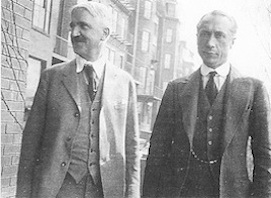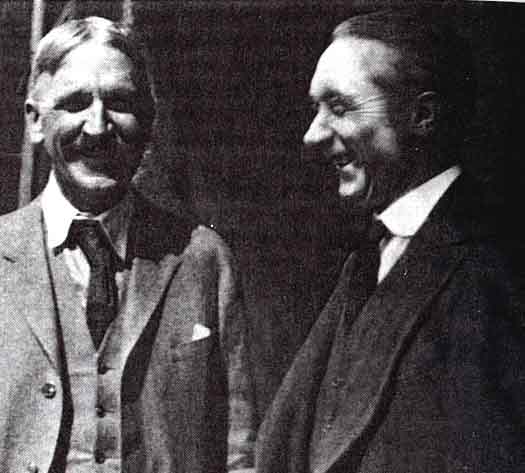
F. Matthias Alexander teaching John Dewey
It (the technique of Mr. Alexander) bears the same relation to education that education itself bears to all other human activities. – John Dewey, from his Introduction to F. M. Alexander’s third book, The Use of the Self
John Dewey (1859-1952) was an American philosopher and the most prominent voice of the school of philosophy known as pragmatism. He also had an enormous influence on American education – indeed, he is sometimes referred to as the “father of American education”.
F. Matthias Alexander (1869-1955) was an Australian who made some very important discoveries about human functioning and behavior, and how individuals could be taught to improve these qualities in themselves. Alexander’s discoveries, and the practical methods he and his followers developed for teaching them, form the basis of what has become known today as the Alexander Technique.
Dewey met Alexander in during World War I when Alexander was visiting New York and he had his first lessons from Alexander at that time. Dewey was then in his fifties, and he continued taking Alexander Technique lessons for the next 35 years.
(Dewey) said that he had been taken by (the Alexander Technique) first because it provided a demonstration of the unity of mind and body. He thought that the demonstration had struck him more forcibly than it might have struck someone who got the sensory experience easily and quickly, because he was such a slow learner. He had always been physically awkward, he said, and performed all actions too quickly and impulsively and without thought. ‘Thought’ in his case was saved for ‘mental’ activity, which had always been easy for him. It was a revelation to discover that thought could be applied with equal advantage to everyday movements.
The greatest benefit he got from lessons, Dewey said, was the ability to stop and think before acting. Physically, he noted an improvement first in his vision and then in breathing. Before he had lessons, his ribs had been very rigid. Now they had a marked elasticity which doctors still commented on, though he was close to eighty-eight.
Intellectually, Dewey said, he found it much easier, after had had studied the technique, to hold a philosophical position calmly once he had taken it or to change it if new evidence came up warranting a change. He contrasted his own attitude with the rigidity of other academic thinkers who adopt a position early in their careers and then use their intellects to defend it indefinitely. – (from a chapter titled “Dewey and Alexander” in Freedom to Change by Frank Pierce Jones.)
In her biography, Jane Dewey quotes her father: “My theories of mind-body, of the co-ordination of the active elements of the self and of the place of ideas in inhibitions and control of overt action required contact with the work of F. M. Alexander and in later years his brother, A. R., to transform them into realities.”

John Dewey and F. M. Alexander
John Dewey wrote the introductions to three of Alexander’s books and in those introductions he repeatedly voiced in his admiration for Alexander and his teaching in no uncertain terms. The quotations below are taken from those introductions:
Many persons have pointed out the strain which has come upon human nature in the change from a state of animal savagery to present civilization. No one, it seems to me, has grasped the meaning, dangers and possibilities of this change more lucidly and completely than Mr. Alexander. His account of the crises which have ensued upon this evolution is a contribution to a better understanding of every phase of contemporary life. His interpretation centers primarily about the crisis in the physical and moral health of the individual produced by the conflict between the functions of the brain and the nervous system on one side and the functions of digestion, circulation, respiration and the muscular system on the other; but there is no aspect of the maladjustment’s of modern life which does not receive illumination. (From Dewey’s introduction to Man’s Supreme Inheritance, Alexander’s first book, originally published in 1918)
After studying over a period of years Mr. Alexander’s method in actual operation, I would stake myself upon the fact that he has applied to our ideas and beliefs about ourselves and about our acts exactly the same method of experimentation and of production of new sensory observations, as tests and means of developing thought, that have been the source of all progress in the physical sciences; and if, in any other plan, any such use has been made of the sensory appreciation of our attitudes and acts, if in it there has been developed a technique for creating new sensory observations of ourselves, and if complete reliance has been placed upon these findings, I have never heard of it. In some plans there has been a direct appeal to “consciousness” (which merely registers bad conditions); in some, this consciousness has been neglected entirely and dependence placed instead upon bodily exercises, rectifications of posture, etc. But Mr. Alexander has found a method for detecting precisely the correlations between these two members, physical-mental, of the same whole, and for creating a new sensory consciousness of new attitudes and habits. It is a discovery which makes whole all scientific discoveries, and renders them available, not for our undoing, but for human use in promoting our constructive growth and happiness.
No one would deny that we ourselves enter as an agency into whatever is attempted and done by us. That is a truism. But the hardest thing to attend to is that which is closest to ourselves, that which is most constant and familiar. And this closest “something” is, precisely, ourselves, our own habits and ways of doing things as agencies in conditioning what is tried or done by us. Through modern science we have mastered to a wonderful extent the use of things as tools for accomplishing results upon and through other things. The result is all but a universal state of confusion, discontent, and strife. The one factor which is the primary tool in the use of all these other tools–namely, ourselves–in other words, our own psycho-physical disposition, as the basic condition of our employment of all agencies and energies, has not even been studied as the central instrumentality. …It is, however, one thing to teach the need of a return to the individual man as the ultimate agency in whatever mankind and society collectively can accomplish, to point out the necessity of straightening out this ultimate condition of whatever humanity in mass can attain. It is another thing to discover the concrete procedure by which this greatest of all tasks can be executed. And this indispensable thing is exactly what Mr. Alexander has accomplished. – (From Dewey’s introduction to Constructive Conscious Control of the Individual, Alexander’s second book, originally published in 1923)
Personally, I cannot speak with too much admiration–in the original sense of wonder as well as the sense of respect–of the persistence and thoroughness with which these extremely difficult observations and experiments were carried out. In consequence, Mr. Alexander created what may be truly called a physiology of the living organism. His observations and experiments have to do with the actual functioning of the body, with the organism in operation, and in operation under the ordinary conditions of living–rising, sitting, walking, standing, using arms, hands, voice, tools, instruments of all kinds. The contrast between sustained and accurate observations of the living and the usual activities of man and those made upon dead things under unusual and artificial conditions marks the difference between true and pseudo-science. And yet so used have we become to associating “science” with the latter sort of thing that its contrast with the genuinely scientific character of Mr. Alexander’s observations has been one great reason for the failure of many to appreciate his technique and conclusions.
“n the present state of the world, it is evident that the control we have gained of physical energies, heat, light, electricity, etc., without having first secured control of our use of ourselves is a perilous affair. Without the control of our use of ourselves, our use of other things is blind; it may lead to anything.
If there can be developed a technique which will enable individuals really to secure the right use of themselves, then the factor upon which depends the final use of all other forms of energy will be brought under control. Mr. Alexander has evolved this technique.” (From Dewey’s introduction to Use of the Self, Alexander’s third book, originally published in 1932) Listen to a short audio interview about this quote: The Alexander Technique and the Future of Mankind
The books cited above, and many other books and DVDs about the Alexander Technique, are available at the Alexander Technique Bookstore

John Dewey and F. Matthias Alexander
Dewey/Alexander Links:
John Dewey’s prefaces to Alexander’s books
Two links to substantial excerpts from “Frederick Matthias Alexander and John Dewey: A Neglected influence” by Eric David McCormack, O.S.B., a 1958 University of Toronto PhD thesis.
Human Nature and Conduct and Frederick Matthias Alexander
Newly available (2022) documents, including correspondence between Frank Pierce Jones, Marjorie Barstow, Professor John Dewey and F. Matthias Alexander, about Alexander Technique developments from the 1940s – 1980s – Part 1 Part 2 Part 3 Part 4 Part 5 Part 6
Frederick Matthias Alexander and John Dewey: A Neglected Influence
The following two links are articles by Dewey that draw upon Alexander’s influence on him:
Preoccupation with the Disconnected
Additional links:
John Dewey and Frederick Matthias Alexander
Professor John Dewey on “Standing up Straight”
ABC’s of Good Posture by the Father of American Education
Posture Commands – Why they Don’t Work
Mind-Body Unity: A Practical Approach
Know Thyself: Habits, Self-Knowledge and Our Future
Meet the Man Behind Functional Psychology – John Dewey
